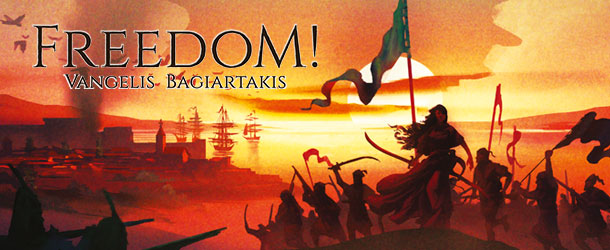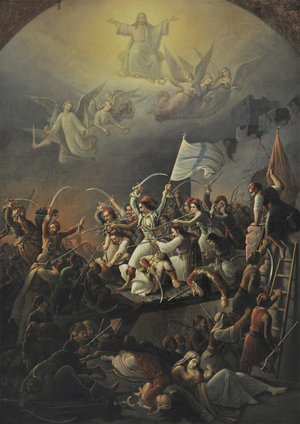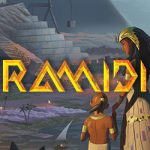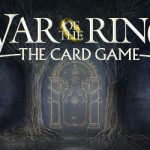The dramatic history of the siege of the Greek holy city Messolonghi by Ottoman forces during the Greek War of Independence is revived in a game: Freedom!, published by PHALANX Games and created by Vangelis Bagiartakis, a Greek game designer and developer who lives in Athens and has worked on more than 30 titles, including "Among the Stars", "Dice City", "Fields of Green", "Kitchen Rush", and "The Pursuit of Happiness". Freedom! was funded on Kickstarter in 2019, and Bagiartakis posted his Designer’s Diary at that time, on BoardGameGeek. As the game is arriving in stores, now is a good time to rediscover the story behind it:
“Ask any designer who's published a few games and he'll tell you there is always one game that took him way longer to get published than all the rest. Freedom! is that game for me. The good thing is that with so many years between concept and publication, you usually end with a pretty good story to share! Here's mine.
Inspiration
Our story starts on a Sunday. Specifically, on March 27th, 2011. It is easy for me to remember that date and you'll soon see why. Every year on March 25th Greece celebrates its Independence Day. It is the date on which the Greek War of Independence against the Ottoman Empire began, which ultimately led to the Greek state as we know it today. The same day is also a religious holiday: the Annunciation to the Holy Mary. As you can imagine, there are many celebrations happening during those days: parades on the streets, school plays, greater doxologies on the churches, festivities, etc.
On that Sunday, a local Sunday school had a small celebration which included a play about the siege of Messolonghi. We knew some of the people there so my wife and I (and our 6-month-old son) decided to attend. The play was very well written and they had done a great job with the sets. And indeed, it was during one of the last scenes of the play that the idea for the game was born.
Before I give you more details on how that idea was formed, I think I must first tell you a few things about Messolonghi. In Greece, everyone knows about this city and its history but outside of our country, not many people have heard about it.
Messolonghi was a small city located in Western Greece which held a key position: It was very well fortified by nature and its harbor was very important, having developed a very powerful Merchant Navy during the 18th century. During the Greek War of Independence (1821) it ended up being the focal point of the Rebellion in central Greece.
The Ottoman Empire made three attempts to capture Messolonghi by besieging it: the first was near the end of 1822, the second one (which was extremely short) in the Autumn of 1823, and the last one, which was the most important one, started on April of 1825.
What seemed like it would be an easy task, ended up lasting way longer than it should. The city would not fall, no matter what the Ottomans tried. About six months in, Ibrahim Pasha (viceroy of Egypt under Ottoman rule and an outstanding military tactician/strategist) was brought to help with the siege, however even he could not get through the fortifications.
The people within the city, even though they would sustain the constant attacks, eventually ran out of food. However, even under those circumstances they held on, refusing to surrender.
After a point, the situation was very bad for both sides. The Greeks were starving, their morale was very low, and they knew that if the city was to fall, they were doomed. The Ottomans on the other hand, had spent a huge amount of resources on the siege yet the city would not fall. The pressure from the High Porte was enormous, their supplies were also running out, and they couldn't sustain their vast army for much longer.
On the 10th of April 1826 (one year after the siege started) the Greeks could not last any longer so they decided to do a sortie and flee from the city during the night. Unfortunately, their plan was betrayed, and the Ottomans were waiting for them, the result being a massacre. The irony was that Ibrahim Pasha later stated that if the siege had lasted 2 more weeks, they would have probably gone away - they couldn't last any longer either.
One would imagine that the fall of the city would mark a significant win for the Empire and would help them quench the rebellion. However, the exact opposite happened. The impact of the 12-month heroic resistance, the legendary Sortie, and the slaughter that followed, was huge. Despite the defeat, the Greek Revolution was now seen in a new light in Europe, which ultimately led to many countries deciding to interfere and help Greece win the war.
Back to our play now.
While I was watching the play, during one of the scenes towards the end, it was mentioned that Karaiskakis (a very famous Greek commander - one of the leaders during the war) was meant to come help a few days before the siege and fight part of the besieging army, but unfortunately got sick and didn't make it. When I heard this, in my mind it sounded like an event card was just played. And that's when it hit me: The siege of Messolonghi could make a great game!
You had a conflict that was very interesting, two asymmetric sides, numerous events taking place, many famous people participating and an end result that was very close and could easily go either way. Why had no one thought of this yet???
Most importantly though: A game around the siege of Messolonghi would bring this event to light and would allow many people to learn its remarkable history. Even beyond that though, the whole concept around the events was fascinating. You had a handful of people rebelling, fighting for their freedom, struggling against all odds to keep the enemy out of their city. On the other side, you had a massive Empire trying to maintain control over its territory. Everyone could relate to that story.
Gameplay-wise the idea was also exciting. Siege games provide a challenge to both players who must prove themselves. "Can I overcome all obstacles and capture the city?" asks one player. "Can I face overwhelming numbers and come out of it still standing?" asks the other. In all games the players are competing, but a siege game is a bit different. It affects both players psychologically. It makes them more involved, more immersed, like there is a personal stake in all this.
I had to do this.
I happened to know the person who wrote the screenplay (Alexandros Chrysanthopoulos) so a few days later I approached him and suggested that we work on a game around Messolonghi. He knew the history well (he had read a lot in order to write the screenplay) so he would provide all the historical background and I would work on the design. Combined, we could bring this to life. He immediately liked the idea and agreed to help me.
Unfortunately, life had other plans for both of us. While we both kept it in the back of our minds, it was never a priority. I was working on other games at the time and I was struggling to combine that with my day job and my family (which was expanding at the time) while Alexandros was still in college with plenty of studying required of him.
Every now and then, we would exchange an idea or two but nothing concrete. In fact, we would always end the conversation with the same phrase: "We need to meet at some point and discuss this."
Luckily, in 2014 some major things happened! One was that I decided to leave my day job and become a full-time game designer. Around the same time, Alexandros (who had finished college by that time) was just ending his military service (compulsory in Greece for all male citizens). He was about to start looking for a job but realized that this was the only period where he could freely work on this project and dedicate plenty of time to it. I agreed that it was "now-or-never" so we started meeting on a regular basis.
First Steps
Before moving forward there were two very important questions that needed to be answered. The first one being the one which would define everything:
"What kind of game are we making?"
When I had first gotten the idea for the game, I had thought of something like "Twilight Struggle" or "1960: The Making of the President". A card-driven war game with the cards depicting actual events that took place and an action-point based system. The "problem" was that this would result in a relatively complex game and would be aimed towards a specific audience. You couldn't easily play it with non-gamer friends for example. The alternative would be something along the lines of "2 de Mayo". I really loved that game (and still do) and I consider it a brilliant example of a game teaching you history very elegantly, through its gameplay. In fact, this game had everything I wanted: Simple, easy to learn rules, rich theme that really came through, and asymmetric gameplay. I had learned history through that game which was exactly what I wanted the players of my game to do.
In the end, and after much discussion, we decided to go the card-driven war game route. We felt it would allow for a richer gameplay experience and would better portray the historic events that took place (since more would be included). After all, that was really our goal; we had an incredible story that we wanted to share with the world, and we wanted to do so in the best possible way!
The second question in our minds was equally important:
How much of the city's history should we include?
There was a LOT of history taking place in Messolonghi. In fact (as I mentioned earlier) it wasn't besieged just once, but three times! Do we put all of them in the game? If so, what happens between the sieges? Moreover, there were many changes in the fortifications during the first siege compared to the last one and the "scope" of each was different.
Once again, after a lot of discussion, we realized that gameplay-wise, it didn't make sense to have all three sieges in the game. And since the last one was the most important one (and the one that lasted the longest) we should focus on that. Unfortunately, that meant leaving Lord Byron out of the game since he had died (in Messolonghi) before the last siege.
It was now time to start designing how the game would play! More on that in the next part!












Follow Us on